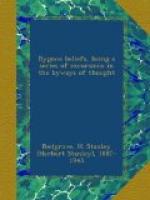THE problem of alchemy presents many aspects to our view, but, to my mind, the most fundamental of these is psychological, or, perhaps I should say, epistemological. It has been said that the proper study of mankind is man; and to study man we must study the beliefs of man. Now so long as we neglect great tracts of such beliefs, because they have been, or appear to have been, superseded, so long will our study be incomplete and ineffectual. And this, let me add,is no mere excuse for the study of alchemy, no mere afterthought put forward in justification of a predilection, but a plain statement of fact that renders this study an imperative need. There are other questions of interest—of very great interest—concerning alchemy: questions, for instance, as to the scope and validity of its doctrines; but we ought not to allow their fascination and promise to distract our attention from the fundamental problem, whose solution is essential to their elucidation.
In the preceding essay on “The Quest of the Philosopher’s Stone,” which was written from the standpoint I have sketched in the foregoing words, my thesis was “that the alchemists constructed their chemical theories for the main part by means of a priori reasoning, and that the premises from which they started were (i.) the truth of mystical theology, especially the doctrine of the soul’s regeneration, and (ii.) the truth of mystical philosophy, which asserts that the objects of nature are symbols of spiritual verities.” Now, I wish to treat my present thesis, which is concerned with a further source from which the alchemists derived certain of their views and modes of expression by means of a priori reasoning, in connection with, and, in a sense, as complementary to, my former thesis. I propose in the first place, therefore, briefly to deal with certain possible objections to this view of alchemy.
It has, for instance, been maintained[1] that the assimilation of alchemical doctrines concerning the metals to those of mysticism concerning the soul was an event late in the history of alchemy, and was undertaken in the interests of the latter doctrines. Now we know that certain mystics of the sixteenth and seventeenth centuries did borrow from the alchemists much of their terminology with which to discourse of spiritual mysteries—JACOB BOEHME, HENRY KHUNRATH, and perhaps THOMAS VAUGHAN, may be mentioned as the most prominent cases in point. But how was this possible if it were not, as I have suggested, the repayment, in a sense, of a sort of philological debt? Transmutation was an admirable vehicle of language for describing the soul’s regeneration, just because the doctrine of transmutation was the result of an attempt to apply the doctrine of regeneration in the sphere of metallurgy; and similar remarks hold of the other prominent doctrines of alchemy.
[1] See, for example, Mr A. E. WAITE’S paper, “The Canon of Criticism in respect of Alchemical Literature,” The Journal of the Alchemical Society, vol. i. (1913), pp. 17-30.




